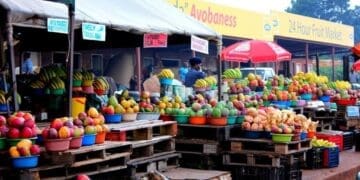Deputy Minister of Trade, Industry and Competition (DTIC) Zuko Godlimpi warns that the recent 30% tariff hike by the United States threatens nearly 30,000 jobs and demonstrates the urgent need for market diversification.
“This is our wake-up call. South Africa cannot rely on a handful of markets or raw material exports. We must reimagine our approach to international trade, build resilience, and include more small and medium enterprises in global value chains,” Godlimpi said during the department’s three-day Export Symposium and Expo in Midrand this week.
The expo held at the Gallagher Estate, brought together over 140 exhibitors and 20 international buyers. The event aimed to showcase South African innovation, promote value-added products, and position SMEs to compete in global markets.
He highlighted the importance of export-led growth, noting that companies that enter global markets adopt cutting-edge technologies, pay higher wages, and create high-quality jobs. He encouraged SMEs, particularly those owned by women, youth, and historically disadvantaged South Africans, to take part in shaping the country’s economic future.
“The future must include thousands of small and medium enterprises, particularly those owned by women, youth, and historically disadvantaged South Africans. The ambition should be for these SMEs to actively export within five years, creating tens of thousands of jobs and contributing billions to the economy,” said Godlimpi.
World Bank Lead Economist Jacques Morisset shared these concerns, pointing out that South Africa’s export market is dominated by a few large companies and that medium-sized firms often struggle to survive.
“Export growth has been lower than in other successful countries, both in Africa and globally,” he said. “South Africa has not diversified enough in terms of markets and products. Companies involved in global value chains are more resilient, and that is where opportunities lie for smaller firms.”
Entrepreneurs attending the Expo said events like this are critical to their growth. Thabo Maripane, director of Manini Holdings in Marble Hall, Limpopo, produces and exports lemons and other citrus fruits to China, Russia, Canada, Indonesia, and the EU.
“We are farmers, and we produce our own citrus on 47 hectares,” Maripane told Vutivi Business News. “Currently, we are building our own packhouse to process and package the fruit to meet export standards. Every market has its own rules China, for example, requires specific cold treatments but accessing these markets allows us to grow and create jobs locally.”
Expanding export opportunities for small businesses not only allows them to grow but also has a broader economic impact. By increasing production, creating jobs, and participating in international trade, SMEs can contribute significantly to South Africa’s GDP and help address unemployment, particularly among youth and historically disadvantaged communities.
Oscar Mmola, founder of Sufficient Grace Trading, which deals in agricultural commodities and mining materials, highlighted the economic role of SMMEs in boosting GDP and reducing unemployment.
“We need flexible policies, accessible funding, and better market information. SMEs have the potential to absorb many unemployed citizens and grow GDP, but only if they are empowered,” Mmola said. “Events like this Expo are key to opening doors and creating real opportunities for small businesses.”
Godlimpi said government will continue to back SMEs through export readiness programmes, mentorship, and preferential access to support schemes. He also stressed that partnerships between government, labour, and business are critical to achieving sustainable export-led growth.






















































